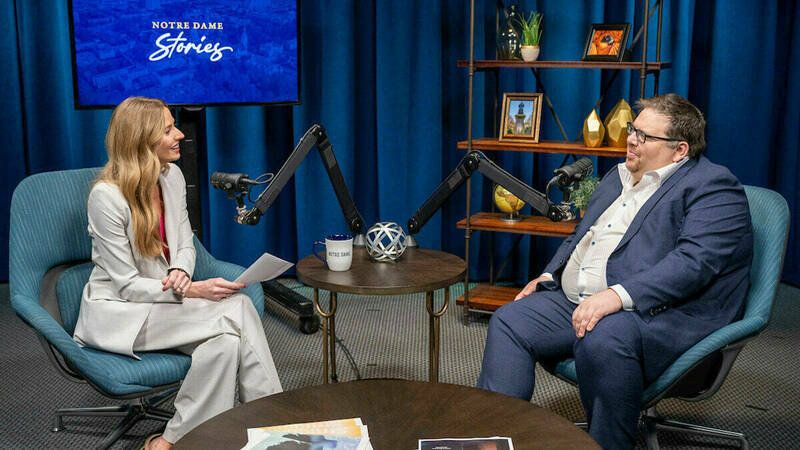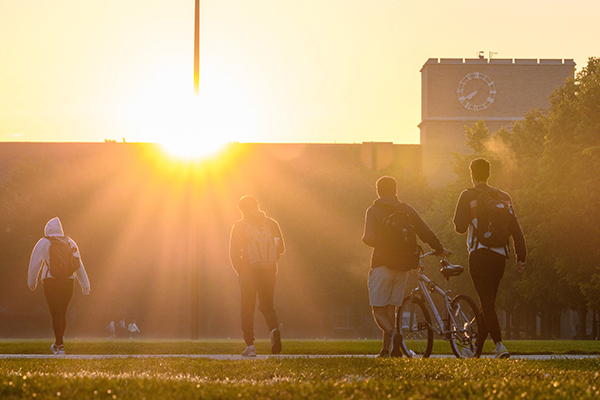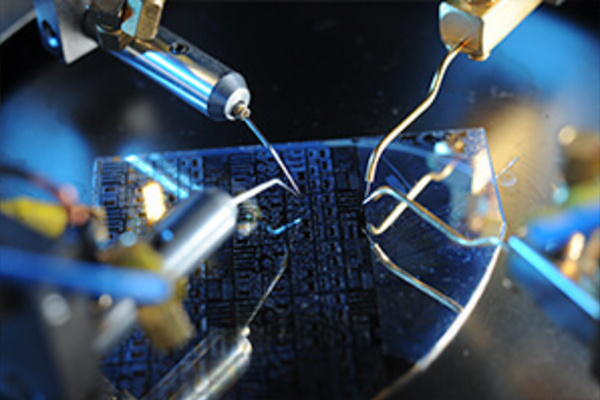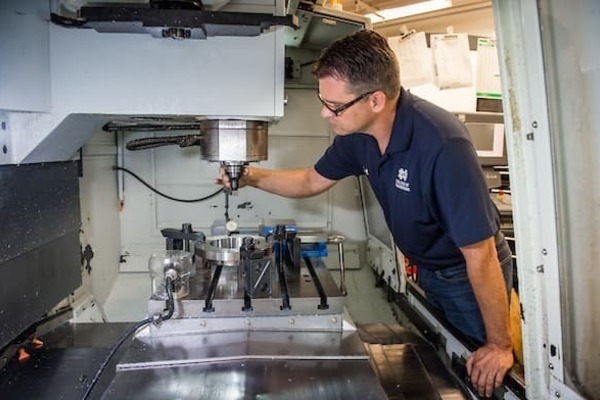Read the transcript
Transcript formatted for readability.
Jeffrey F. (Jeff) Rhoads: I find it to be such a powerful North Star to say we want to be a force for good. And if we recognize that, and say that our teachings tell us that that is our mission, then it is a very easy—forgive me for oversimplifying, but—litmus test to say, ‘Is this research empowering good in the world?’
Jenna Liberto: The University of Notre Dame has experienced transformational growth in research over the past decade. The evidence is everywhere on campus, both in the talent of the faculty and the resources devoted to making Notre Dame a leading research institution. In this episode of Notre Dame Stories, I talk to Vice President for Research Jeff Rhoads, who shares his plans for expanding the University’s impact globally.
Jeff, thank you so much for being with us.
Jeff Rhoads: Thanks for inviting me, Jenna. It’s good be here.
Jenna Liberto: I appreciate having you. Before we get into our slate of questions, I’d love to hear a little bit about your Notre Dame story.
Jeff Rhoads: Thanks, Jenna. It’s fun. I’ve been here now, I think, about eight months. It’s been relatively wild and fast eight months in many, many good ways. But, you know, it feels like coming home a little bit. I grew up in the Midwest. I had the opportunity of working 17 years down the road at Purdue University and, in that time, had the opportunity to engage with Notre Dame from afar, in many cases very positive interactions. My predecessor, as you may be aware, was my predecessor at Purdue as well. So I knew a lot about what I was getting into here at Notre Dame.
And then the other thing that of course happened is, 11 years ago this week, you know, I met—well, actually, 13 years ago—11 years ago this week, I married my wife here on campus. And she’s a proud third-generation alum. And, you know, it was a good opportunity. We were married on campus, the kids were baptized here—so it’s a great opportunity to come back and to be a part of something that I’ve been on the periphery of for years but now really be an integral part of as we move forward. So it’s been a lot of fun.
Jenna Liberto: It’s easy to see why it feels like home; it is in many ways.
Jeff Rhoads: Exactly right.
Jenna Liberto: And we’re so glad to have you. Let’s talk a little bit about where we’ve been and where we’re going as a university.
So Notre Dame has grown its research footprint exponentially—$200 million in growth over the past decade and on track to continue that trajectory, right? So I guess my first question is, what are the key components to what has happened so far?
Jeff Rhoads: So, I think it’s a real convolution of two things happening at the right time and in the right place, right? So we have the benefit, frankly, of having faculty and staff and students with really good ideas. And at the end of the day, to be productive in research, you have to have those good ideas to start. It doesn’t matter what discipline you’re in—if you’re an artist or if you’re an electrical engineer—you have to start with good ideas to advance things forward.
So we have a convolution of those, but also we have an institutional commitment—an institutional commitment that’s grounded in our unique mission as a University. I think what that allows us to do is to say OK, we have this North Star of being a force for good in the world. We can think about, in our individual disciplines, how to do that, and then we can build the structures in place to actually enable that research to happen.
So in this case, the confluence of two things is the ideas that I talked about earlier and then building support structures, right? Finding the personnel that can help write the proposals, that can help execute the grants and the contracts, and other vehicles that we use to receive funds from our partners to actually perform work. And so it’s taken a combination of the idea and the support structure to make that happen.
And, I’m really proud to say, there’s a lot of metrics that you can use to measure success—I prefer impact metrics but dollars are often easier to count—and, you know, we’re going to announce, pretty soon, a $50 million research increase in one year. That’s nearly unprecedented for any university, let alone the University of Notre Dame, as we’re trying to grow. And I think it’s just one key indicator of what’s on the horizon for us.
Jenna Liberto: You alluded to this, Jeff, that it’s easy to think of research in terms of science and engineering—but really, research on the campus of Notre Dame, it spans our disciplines. Can you give me, maybe, some examples of where that’s the case here?
Jeff Rhoads: You know, absolutely. I mean, I often joke that we have everything A to Z here on campus. I don’t think zoology is a major but, you know, it seems like we still span everything. And there’s so many great examples where, not only are we doing awesome things in science and engineering, but we’re doing it in the art and humanities, we’re doing it in law, we’re doing it in business.
One of the things that I enjoy in my office is, I have the opportunity to look at where some of the funding comes from and where some of the publications that our faculty and students produce. I was reading one the other day, a grant proposal that went in—and was funded internally—about some work being done to look at the women printers of Venice and how, in the early days of printing and publication, women played a unique role there. And there were job programs aimed at giving women an opportunity to grow. And so, you know, just some very unique things like that.
I was reading some work the other day about some folks in our Law School thinking about the ethical use of advanced weapon technology, for example, and thinking about that from a legal perspective, but bringing a unique Catholic perspective to some of those issues as well. And so, you know, whether it spans the arts, the humanities, or the sciences, I think there’s some great things going on. Another example might be in architecture, where we have a lot of people rethinking urbanism and what does that look like, and then applying those, not only in a sense that applies around the world, but also what it looks like in our own communities—whether that’s in Elkhart or South Bend—and thinking about how those communities can be forward-looking towards tomorrow.
I mean, those types of things excite me just as much as the science and engineering.
Jenna Liberto: And when you talk about potential impact, when your scope is as broad as ours are, so too is the potential for that great impact.
Jeff Rhoads: Absolutely. I mean, and that’s one of the things I really enjoy about this job. In a number of my previous jobs, I’ve been able to dive really deep in a fairly narrow area. And because we’re such a varied University, I have the pleasure of seeing the just amazing things we’re doing across the spectrum.
And so, on any given day, I might be, you know, learning about what our faculty and students are doing and saying to help address the opioid endemic, and then pivot into learning about the future of music and sacred music and how can we bring faith to people in new ways through music. It’s just this amazing play back and forth—I get to see it all. And it’s the impact Notre Dame faculty and students and staff are having.
Jenna Liberto: In addition to the funding and the great ideas, what are the other key things that let you know we have arrived as a research University?
Jeff Rhoads: You know, I think there are both public-facing things and then there’s things in private, and both sets of indicators, I think, are rather refreshing. You know, I take no credit for this but I was very proud of the fact my very first day, you know, Notre Dame was admitted into the AAU (Association of American Universities), which is just such an important recognition of the fact that Notre Dame is on this amazing trajectory as a research university, recognizing that we’ve had expertise in so many other areas—like undergraduate education—but we’ve been able to really emerge on the research front to be amongst a very elite set of schools that are our peers now.
And I was just excited. I just got back from my first AAU meeting of research officers and, you know, folks there were asking me what is Notre Dame doing to have this tremendous growth? How are you having the impact on the world that you’re having? What are the kind of trade secrets that you’ve found?
And certainly, that’s not a reflection of me, that’s a reflection of the team that supports the Office of Research and all of our faculty, students, and staff. And so, those are public indicators, right? Not only hearing about the admission in the AAU, but also having people ask. But there’s also the personal ones that mean as much to me. You know, one of the things is I have the opportunity to talk to a lot of folks in government service, and having them come to me and say, ‘Hey, thank you for what Notre Dame’s doing, you’ve changed public policy through this research’ or ‘you’ve changed something in the United States.’
We’re talking to community leaders and hearing about the impact that work we’ve done to look at, say, the efficacy of social programs, how that’s led to better investment in communities and that are improving lives, right? And I think, it’s just all of those, both public and the subtle private indicators, that makes me really confident we’re heading in the right direction.
Jenna Liberto: Thank you for detailing those; that’s very interesting. I remember when you first arrived on campus and we were able to meet and speak a little bit. You talked about the importance of research in terms of not just graduate studies, but the undergraduate experience, and that is such a profound experience to us here at Notre Dame. Now being here for eight months, what is your take on how that is going on campus?
Jeff Rhoads: As I said to you then and I still very much believe, Jenna, you know, the undergraduate experience is only enriched by exposure to research. You know, whether it’s our faculty bringing to the classroom the examples of their research and where the cutting-edge things are happening in the respective discipline, and introducing those to our students early so that they truly understand the latest and greatest in their field, or whether that’s taking students and giving them experiential opportunities to actually think about the process of discovery and about innovation, and taking that into their studies as an integral part of the education, just like we’d consider all the other things around Notre Dame to be part of the experience—I think it only enriches what they get out of this, you know?
And one of the joys that I get to see is our undergraduates doing those things. There’s some amazing fairs in the summer where we can see them interacting with projects and, you know, we had good fun last year to watch some undergraduates talk to our alums who, maybe, didn’t have research opportunities when they were here, about how it shaped their Notre Dame experience even beyond all the other things that make Notre Dame special.
But I also think about times where I’ve been out visiting some of our environmental research centers and we have students out in boats, like, collecting pond water and looking at aquatic specimens, you know, and trying to do really hardcore science based on those things, and them talking about how what they’re doing is not only setting them up for a career, but setting [them] up for the opportunity to, you know, think about the ecological future of the world—and it’s just an amazingly powerful thing, and shame on us if we restrict it to only grad students, right? I think it should be part of every student’s experience.
Jenna Liberto: Talk about impact. I mean, that starts with inspiration.
Jeff Rhoads: Exactly right.
Jenna Liberto: Important time. One thing I know you’re passionate about, Jeff, is translational research, and I would sort of define this for myself as research that impacts me directly or someone I love. How would you define that, and why is that such a key piece of your work here?
Jeff Rhoads: Yeah. So I think there’s two things to recognize, you know. The scholarly reputation of a university is often driven by its very fundamental and basic research that it does. And that’s an important part of our mission, to have scholarly impact as a University, but I feel, equally important to having that scholarly impact, we need to have practical impact.
You know, our mission calls us to be a force for good, as we’ve talked about, and that means that sometimes we have to not only play the long game, which is basic research, but we should look at where we can play the short game as well. And so, that is research that directly impacts people.
And I think there’s a lot of ways to think about this with recent investments in federal funding through the Chips Plus Science Act, co-sponsored by our own local senator. We can see where it’s impacting, say, the future of semiconductors in America, and trying to reshore and onshore that industry, which is so critical to national security and economic security.
But we can also think about work that we’re doing within the local mental health space and trying to bring the most advanced mental health techniques that we’re studying in the laboratory, and bringing them to our community.
Or we could think about, you know, downtown South Bend. We have a facility there looking at the next generation of propulsion systems, right? For aircraft. And so it’s a combination of these types of projects that span, again, all the disciplines represented at Notre Dame. That if we can do both the basic things, casting the long horizon of impact, but also saying, OK, where are there advancements that we can do in the short term to improve the human condition? I mean, how much better is the balance of those two things to set the mission alignment right?
Jenna Liberto: Let’s talk about the next step now. How do we, as a university, take what’s happening now in terms of research and make it of global impact? And is that your next step?
Jeff Rhoads: Yeah. Yeah. Absolutely. I mean, I truly believe that the future of Notre Dame is to think about, how do we move from the amazing level of impact we have now and continue to spread it around the globe, in particular recognizing that our constituency is increasingly a global constituency? And that the problems—the wicked-hard problems—that face society right now are not domestic problems or Indiana problems or South Bend, Indiana, problems—they’re global challenges, right?
Thinking about food, global electrification, clean water, climate change—all these things have to be tackled across the globe, they can’t be tackled locally. And so we’re going to have to figure out how to get better at doing research abroad, right? And, in particular, paying attention to where global demographics are shifting. Whether it’s the Global South, and thinking about presence in places like Africa and South America that, maybe, historically, universities in this country have not had as big of impact. ... And so, we have to think about ways to do that.
We have to think about ways that do that that are not, for lack of better term, neocolonialism, right? We don’t want to come in from the outside and try to impose solutions on people. We want to work with those people hand-in-hand and think about how collectively. Because, let’s be honest, we can learn as much as we can teach, and I think that’s really important for a world-class university—to be able to do both of those things together. So, what we have to do, as a university first, and as a research administrator, is build the structures that enable it to happen.
Because I’m confident that our faculty and students, with all their ideas, will have impact. But first, we’ve got to build the platform on which to do that. And I think we have some really clever ideas to do it. I think we’ll have some announcements rolling out throughout the year, and I’m really excited to share those with the Notre Dame community and wider audience as well.
Jenna Liberto: Jeff, put our conversation in the context of Notre Dame—not just as a world-class research university but a world-class Catholic research university. How does that shape what we do and how we do it?
Jeff Rhoads: You know, I don’t want to oversimplify this, and you’ll have to forgive me, but I think the easiest way to think about it is that our Catholic grounding prescribes a mission, and it’s a mission that I think most of our faculty and staff, if not all of them, buy into. And again, it sometimes becomes cliché because we use it so much, but I find it to be such a powerful North Star to say we want to be a force for good. And if we recognize that, and say that our teachings tell us that that is our mission, then it is a very easy—forgive me for oversimplifying, but—litmus test to say, ‘Is this research empowering good in the world?’
That to me is an easy litmus test to look at. And once we have that, we say, well, how can we amplify that, right? And my job is to create the path of least resistance for our faculty, students, and staff to be able to accomplish that. And I think there’s a lot of things we can do.
It’s also something that empowers people. Frankly, it’s very easy for me to get up every morning and say, ‘What am I doing this for?’ Well, I want to be a force for good, right? And so, I think it’s an easy sell. And I think it’s an easy way for us to continue to build our brand, our reputation, and, most importantly, our impact.
Jenna Liberto: Sometimes the simple answer is the right one, right?
Jeff Rhoads: Yes.
Jenna Liberto: Thank you so much for talking to us.
Jeff Rhoads: My pleasure.
Jenna Liberto: Will you come back and speak with us in eight more months and we’ll see how things are going?
Jeff Rhoads: Any time you want, Jenna.
Jenna Liberto: Successful, I’m sure.
Jeff Rhoads: Thank you.
Jenna Liberto: Thanks so much.
Jeff Rhoads: I appreciate it.
Jenna Liberto: Thanks for joining us for Notre Dame Stories, the official podcast of the University of Notre Dame. Find us at stories.nd.edu and subscribe wherever you get your podcasts.
Notre Dame Stories is created by the Office of Public Affairs and Communications. With executive producer Andy Fuller, content coordinator Staci Stickovich, editors Michael Wiens and Jessica Sieff, videographers Zach Dudka and Tony Fuller. Our music is by Alex Mansour. I’m your host, Jenna Liberto.
Notre Dame Stories is the official podcast of the University of Notre Dame. It was created by the Office of Public Affairs and Communications. Written and produced by Andy Fuller with content coordination from Staci Stickovich, edited by Michael Wiens, and videography by Tony Fuller and Zach Dudka. Original music is by Alex Mansour. Listen and subscribe wherever you get your podcasts.



